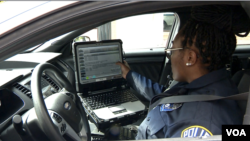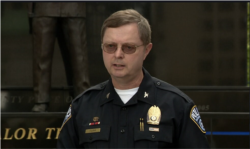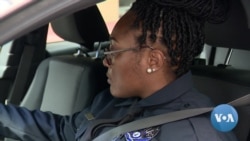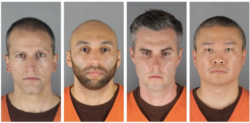Patrice Malone has been a police officer for two years. She believes going to college, where she majored in criminal justice, makes her a better police officer.
“Dealing with people on a regular basis in college, and then coming out and being able to deal with the community, college provided me that aspect and gave me the courage and everything I needed,” says the Arlington County, Virginia, police officer. “And patience, a lot of patience, to go out, talk to people.”
The deaths of several Black men and women while in police custody has focused attention in the U.S. on the training police receive. Arlington County requires its officers to have college or other experience. That requirement puts the Virginia law enforcement agency in the minority. The majority of U.S. law enforcement agencies — more than 80% — require only a high school diploma, according to a 2017 study.
Arlington County Police Chief Jay Farr noticed a difference earlier in his career while working for a smaller police force that did not require a higher education.
“Not to be in a disparaging way, but I think that the perspective of a lot of people I worked with was really limited, very narrow in scope,” Farr says. “Not being exposed to different points of view, not having been challenged about that through an academic environment, I think really played a difference in how they work within the community.”
Farr, who is also a college professor, is a strong believer in higher education for police officers.
“College teaches you how to be a critical thinker. A big part of the college experience is for you to look at things and to think through them beyond the obvious,” he says. “I don't think that the fact that someone went to college or not necessarily makes them better at the ability to be a police officer in the sense of the technical skills of the job. I think it makes them a much better officer in having the ability to be more willing or open to dealing with different cultures, different points of view, different thought process.”
Gaylene Armstrong, director of the School of Criminology and Criminal Justice at the University of Nebraska Omaha, says police these days are required to do more than the role the job was originally supposed to serve within the criminal justice system.
“We call on our police officers to be part law enforcement, part social worker, part assisting individuals who are in mental health crisis — a whole spectrum of issues,” Armstrong says. “Our law enforcement officials in America are some of our first responders to all kinds of crises and need situations.”
A college education, in addition to standard training at a police academy, could help officers deal with their ever-expanding role in society.
“The idea is that individuals who have a broader education and more professional development would have other skill sets that are developed that would help them with de-escalation through use of verbal interaction,” Armstrong says. “Perhaps differences in interpretations of behaviors that some may view as aggressive, others, who have a more well-rounded background and broader lived experiences, would have a context for those behaviors.”
WATCH:
A 2010 study published in Police Quarterly found that college educated police officers are 40% less likely to use force on the job.
“One of the things you hear all the time is whether there's bias in law enforcement,” Farr says. “Well, it's ridiculous to think that everyone out here doesn't have any kind of bias at all. But what's critical is you understand what those are, and you manage those things. And I think college and that exposure really helps you with that.”
It appears a college education did not change the outcome for George Floyd. The Minnesota man died in May after a police officer knelt on his neck for nearly eight minutes. Three of the four officers charged in relation to Floyd’s death reportedly graduated from college.
Referring to the Black Lives Matter protests that erupted after Floyd’s death, Farr believes concerns about police training are valid. However, money and resources make it difficult to set a national standard for the training and education of law enforcement officers.
“You get sort of painted with the same brush, that all the police are excessive in force and brutal in how they treat people,” Farr says. “It’s a little discouraging.”
Malone has noticed a difference in some of the people she deals with on the job.
“It's changed a little bit,” she says. “The community might be a little distant. But … you just go out, you do the same thing that you did before. You just reassure the community that you're there for them, that you're there for their safety. And that's how you regain their trust.”









